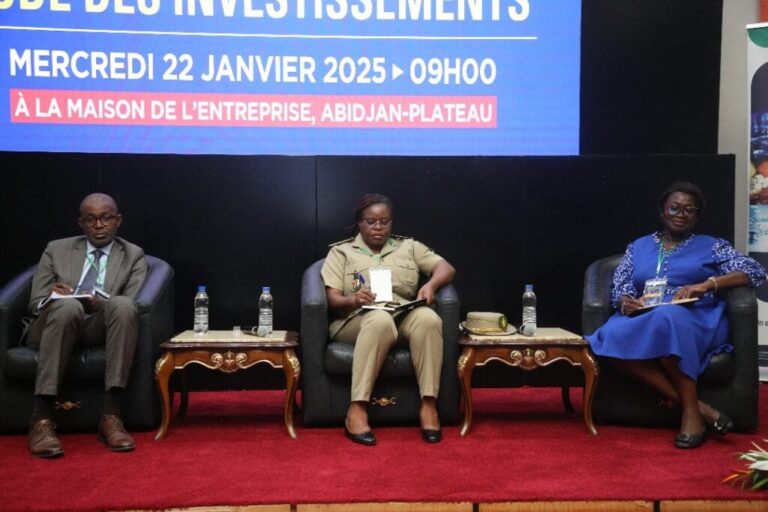The General Confederation of Enterprises of Côte d’Ivoire (CGECI) held a workshop on January 22, 2025, to present the key provisions of the recently reformed Investment Code.
The reform, implemented in September 2024, aims to streamline administrative procedures and enhance support for businesses.
Mr. Soro Nagolo, President of the CGECI’s Business Environment and Competitiveness Commission, emphasized that the revised code seeks to create a more favorable environment for businesses by simplifying administrative processes and strengthening support for structuring projects.
The workshop served as a platform for dialogue and co-construction between the government and the business community. It provided an opportunity to present the key orientations of the revised Investment Code and inform companies about tax and customs incentives.
Ms. Sandrine Tegnan, Director in charge of facilitations at the Center for the Promotion of Investments in Côte d’Ivoire (CEPICI), highlighted the importance of on-site inspections to ensure compliance and facilitate the issuance of operating licenses.
Ms. Solange Amichia, Director General of CEPICI, emphasized the code’s focus on supporting the processing of local raw materials to increase value addition and reduce reliance on raw material exports.
The revised Investment Code includes provisions for sanctions, such as the suspension of investment code benefits for non-compliance and fines for failure to provide required documents after inspection visits.
These reforms are expected to enhance Côte d’Ivoire’s investment climate, attract foreign direct investment, and stimulate economic growth.
Attractive tax incentives to boost investment
Côte d’Ivoire revised Investment Code offers significant tax incentives to attract investors and stimulate economic growth. These incentives vary depending on the investment zone, company size, and the nature of the business.
Companies can benefit from reduced or waived customs duties on imported equipment and materials necessary for their operations. In certain cases, companies may be exempt from Value Added Tax (VAT) during the investment phase.
Large companies receive a 50% partial exemption, while SMEs enjoy a 75% partial exemption. Large companies can benefit from a 100% exemption or a 50% partial exemption for ten years. SMEs are eligible for a 100% exemption for the first five years or a 75% partial exemption for ten years. Large companies can receive a 100% or 75% exemption, while SMEs are eligible for a 100% exemption for 15 years.
Companies in designated categories can opt for tax credits instead of exemptions. The amount of the tax credit is determined based on the actual investment made.
These incentives aim to encourage investment in various sectors, promote economic development outside of the capital city, and support the growth of Small and Medium Enterprises (SMEs). By offering attractive tax benefits, the Ivorian government seeks to create a more competitive business environment and attract both domestic and foreign investors.
Taxes and duties covered in new regulations
The new regulations encompass several areas of taxation, including taxes on profits (BIC), the minimum flat-rate tax, contributions from patents and licenses, and employer contributions concerning national employees—excluding the apprenticeship tax and the additional tax on continuing vocational training.
Additionally, the regulations address the Value Added Tax (VAT), which will apply solely to category 2 for tax credits. Other taxes covered include property tax, real estate tax, and tax on income from securities for dividends paid to national shareholders in zones B and C.
Ms. Solange Amichia, the Director General of the CEPICI, announced the digitalization of the approval application process using a new online platform for receiving and monitoring applications.
Certain sectors are excluded from the Investment Code, including the acquisition and importation of used vehicles, cement production, primary wood processing, manufacturing of alcoholic beverages, importation of butane gas cylinders, and operations of concrete plants.
AP/Sf/fss/abj/APA


